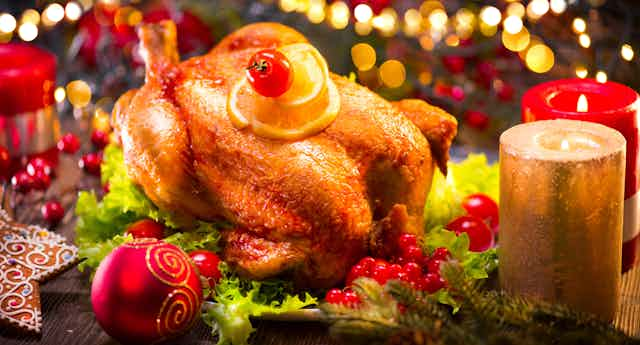The Victorians introduced many of the traditions we now associate with the festive season. Along with Christmas cards, crackers, mince pies and Santa Claus himself, they are responsible for the modern day Christmas dinner. While British households would once have had goose or beef at the centre of the table, by the end of the 19th century most were eating turkey.
In the intervening years, many of us have taken this festive feast for granted. Nothing lasts forever, though, and growing populations and changing economic conditions could easily make Christmas Future look less rosy than what has gone before.
We still produce enough food for the time being, but it is not well distributed and much is lost at different points in the supply chain. There have already been some unnerving reminders in recent months about how easily food security can be compromised. So read on with trepidation.
Christmas critters
We lose around 25% of the food we produce to pests and diseases, and there have been some salient examples lately. Turkeys have been under threat from bird flu. First there were outbreaks in more than 12 countries in mainland Europe, including France and Germany, such that British farmers were ordered by the authorities to keep their birds indoors as a precaution. This meant some turkeys would technically fail the requirements for free-range status by spending too long in barns.
Then came the news a couple of days ago that bird flu had been detected on a turkey farm in Lincolnshire in the east of England. Up to 5,000 birds were culled to prevent the spread of this highly infectious virus.
The UK’s Food Standards Agency is saying bird flu does not pose a food safety risk and it is not believed this year’s turkey supply is under threat. But bird flu is only one infectious pathogen which can affect farm animals: farmers are fighting a constant battle against diseases, with foot and mouth and BSE only the best known other culprits.

Turkey farmers at least have the advantage that they can keep their birds indoors. Crop farmers do not have that luxury, as farmers of Brussels sprouts have been finding to their cost. Their crops have been under attack from diamondback moths arriving earlier and in greater numbers than usual. Farmers in Lincolnshire, who supply two-thirds of what the UK consumes, report a drop in output of up to 60%.
These are age-old problems, of course. But in a world of mounting pressure on food supplies, eradicate pests and diseases and we wouldn’t need to increase production so much to feed the growing population.
In addition, climate change and more intensive farming are causing new and emerging diseases. Take prawn and shrimp production, which since the early 1990s has been under attack from white spot syndrome virus, probably due to more intensive farming. Another example is salmon farming, which routinely struggles with sea lice because fish are bred in confined spaces. Worth considering as you tuck into your smoked salmon or prawn cocktail starter on December 25.

Coming down the chimney
Political uncertainty is another risk to people’s food security. Due to the uncertainties of Brexit, one estimate is that Christmas dinner will cost 14% more than last year – and that’s before the UK actually withdraws from the EU. The row over the price of products including Marmite earlier in the year between Unilever and Tesco was a taste of what is to come.
Inflation is expected to rise steeply in 2017, which is a trend that ought to make politicians nervous. Rapid price increases in other countries have been the cause of civil unrest, and it is certainly not unthinkable that the same could happen in the UK. It was already recently estimated that more than 8m people in the UK are struggling to put food on the table, and inflation will only push more to the brink.
Then there is climate change, which threatens food both from long-term change and increased annual variations. We are seeing more and more extreme weather events and these are set to get worse. Since so many plants depend on weather conditions, expect upheaval.
In 2011 in the UK, for example, there was a shortage of holly due to early frosts but a bumper crop of mistletoe due to a mild autumn. Yet in Texas that year, a drought caused a mistletoe shortage.

Clearly mistletoe and holly are not issues of food security but root vegetables are. In January, there were concerns that parts of the UK were losing lots of carrots and parsnips because flooding was causing them to rot in the ground.
Water also needs a mention here. The southern UK has already had summer hosepipe bans for many years to cope with water shortages. This will be as nothing compared to the global water battles that climate change and population growth make increasingly likely.
Big waists, not big waste
Christmas dinner is probably safe for this year, but many of the issues we are encountering suggest more serious things to come. This brings into focus the amount we waste each year.
The UK throws away around 7m tonnes of food and drink each year, more than half of which could have been consumed; and at Christmas the country throws out 5m Christmas puddings, 2m turkeys, 74m mince pies and huge amounts of vegetables, fruit and snacks. When you reflect that food security is a global issue, and that many countries have a much harder time feeding themselves than the UK, waste really needs to move up the agenda.
Beyond this we need to start finding solutions to the major threats to food from climate change and population growth. In a civilised world, it’s vital that everyone can have access to decent food – and a feast at Christmas if they want one.

